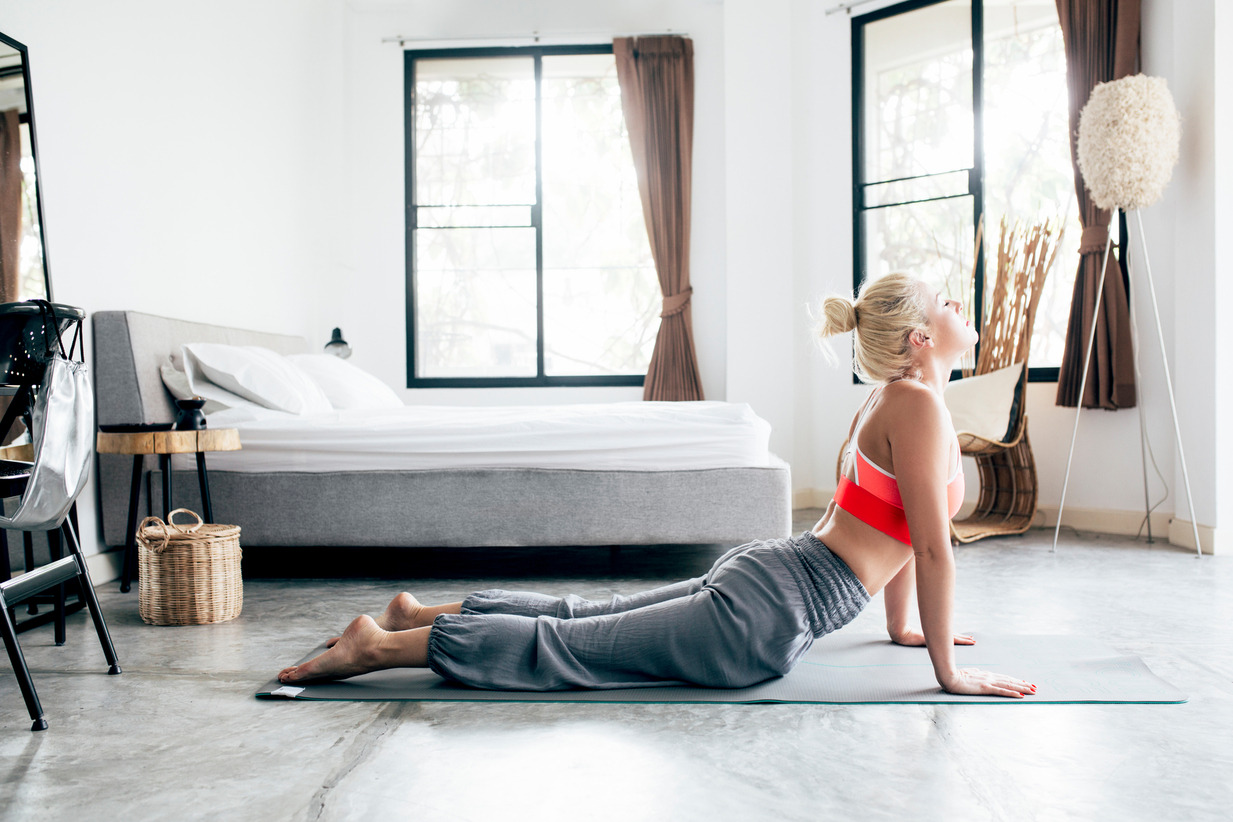Home>Misc>Featured>How Many Hours Before Bed Should You Exercise


Featured
How Many Hours Before Bed Should You Exercise
Modified: January 22, 2024
Get expert advice on when to exercise before bed. Find out how many hours before bedtime is the ideal time to work out for a restful sleep. Featured tips and recommendations!
Introduction
Exercise and sleep are two vital components of a healthy lifestyle. Regular physical activity not only improves physical fitness and overall well-being but also has a significant impact on sleep quality. Many individuals wonder, “How many hours before bed should you exercise?” as they seek to optimize their sleep patterns.
Various studies have examined the relationship between exercise and sleep, highlighting the benefits of physical activity on sleep duration and quality. However, the timing of exercise plays a crucial role in determining its effects on sleep. While exercise is generally known to promote better sleep, exercising too close to bedtime can disrupt sleep patterns and make it harder to fall asleep.
This article will delve into the impact of exercise on sleep, specifically addressing the optimal timing of exercise to promote better sleep. We will explore the effects of late-night exercise on sleep and discuss the factors to consider when choosing the best time to exercise for improved sleep quality. Additionally, we will provide some practical tips for those who wish to exercise before bed.
By the end of this article, you will have a better understanding of how exercise can impact your sleep and how to make strategic choices when incorporating physical activity into your daily routine. So, if you want to experience the benefits of exercise without sacrificing your sleep, keep reading to discover the ideal timing for your workouts.
The Impact of Exercise on Sleep
Regular exercise has been shown to have numerous benefits for both physical and mental health. When it comes to sleep, engaging in physical activity can significantly improve sleep quality and duration.
Firstly, exercise promotes the release of endorphins, also known as “feel-good” hormones, which can reduce stress and anxiety. By reducing these negative emotions, exercise can help relax the body and mind, making it easier to fall asleep and achieve a deeper and more restful sleep.
Furthermore, physical activity increases body temperature during the exercise session. After exercise, the body gradually cools down, mimicking the natural drop in body temperature that occurs during sleep. This drop in body temperature signals the body that it’s time to wind down and prepare for sleep. As a result, individuals who exercise regularly often experience quicker sleep onset and better sleep efficiency.
Exercise also has a positive impact on the regulation of circadian rhythms, the internal biological clock that regulates sleep-wake cycles. By engaging in regular exercise, individuals can help synchronize their circadian rhythms and promote a more consistent sleep schedule. This can lead to better sleep quality, increased alertness during the day, and reduced daytime sleepiness.
Moreover, exercise has been found to alleviate symptoms of certain sleep disorders, such as insomnia and sleep apnea. Studies have shown that aerobic exercise, in particular, can improve sleep patterns, reduce the severity of insomnia symptoms, and decrease the frequency of sleep apnea episodes. By addressing these underlying sleep disorders, exercise can contribute to overall improved sleep quality.
Overall, incorporating regular exercise into your routine can have a positive impact on your sleep. However, it’s important to consider the timing of your exercise to optimize its effects on sleep quality. In the following sections, we will explore the best time to exercise in order to achieve better sleep outcomes.
The Timing of Exercise and Sleep
While exercise is generally beneficial for sleep, the timing of your workouts can greatly impact your sleep quality and quantity. Understanding how exercise affects sleep can help you determine the best time to engage in physical activity for optimal sleep outcomes.
Exercise stimulates the release of adrenaline and increases heart rate, which can lead to increased alertness and energy levels. For some individuals, exercising too close to bedtime can make it difficult to fall asleep, as they may still feel energized from their workout. Additionally, the increase in body temperature during exercise can take a couple of hours to return to normal, potentially interfering with the natural cool-down process the body goes through before sleep.
Experts suggest that exercising earlier in the day, ideally in the late afternoon or early evening, is generally the best time for improving sleep quality. This allows the body sufficient time to cool down and relax before bedtime, promoting a smooth transition into sleep. Exercise during these hours can also help relieve stress and tension accumulated throughout the day, aiding in relaxation and improved sleep.
However, it’s important to note that individual responses to exercise and sleep can vary. Some individuals may feel invigorated after an intense evening workout and have no trouble falling asleep, while others may experience sleep disturbances. It’s essential to listen to your body and pay attention to how exercise affects your sleep patterns to determine the most suitable timing for your workouts.
It’s worth mentioning that morning exercise can also have positive effects on sleep. The rise in body temperature and increased alertness from morning workouts can help individuals feel more awake and alert during the day, which can contribute to better sleep at night. Morning exercise can also jumpstart your metabolism and provide you with a boost of energy throughout the day.
Ultimately, finding the optimal timing for exercise and sleep will require some experimentation and self-awareness. Pay attention to how different workout times impact your sleep quality and adjust your exercise routine accordingly. The goal is to strike a balance where exercise energizes you during the day while ensuring a deep and restful sleep at night.
Effects of Late Night Exercise on Sleep
Engaging in late-night exercise, particularly within a few hours of bedtime, can have significant implications for your sleep. While exercise is generally beneficial for sleep, exercising too close to bedtime can negatively impact the quality and duration of your sleep.
One of the main reasons late-night exercise can disrupt sleep is due to its stimulating effects on the body. Physical activity increases adrenaline levels and elevates heart rate, causing a surge in alertness and energy. This heightened state of arousal can make it more difficult for your body and mind to wind down and transition into a relaxed state conducive to sleep.
In addition, participating in vigorous exercise shortly before bed can cause an increase in body temperature, which takes time to cool down. This rise in body temperature contradicts the natural drop in temperature that occurs during sleep onset, further hindering the body’s ability to enter a relaxed state and fall asleep easily.
Research has shown that individuals who engage in late-night exercise tend to have difficulty falling asleep and experience more fragmented sleep patterns throughout the night. This can result in reduced sleep efficiency and overall poorer sleep quality.
Furthermore, late-night exercise can disrupt the circadian rhythm, the internal biological clock that regulates our sleep-wake cycle. Exercising too close to bedtime can confuse the body’s natural rhythms, making it harder to establish a consistent sleep schedule. This can lead to difficulties in falling asleep and waking up at the desired times and can exacerbate feelings of daytime fatigue.
Additionally, individuals who exercise late at night may also experience an increase in mental and physical arousal, making it challenging to relax and unwind before sleep. This can result in heightened levels of anxiety and a delay in the onset of sleep, ultimately reducing the overall duration of sleep achieved.
It’s important to note that everyone’s response to late-night exercise may vary. While some individuals may not experience significant disruptions in sleep quality, others may find that late-night workouts have a pronounced negative impact on their ability to sleep well.
To optimize your sleep, it is generally advised to avoid engaging in intense exercise within two to three hours before bedtime. This will allow your body ample time to cool down, unwind, and prepare for a restful night’s sleep.
Optimal Time to Exercise for Better Sleep
Establishing an optimal time to exercise can have a significant impact on the quality of your sleep. While individual preferences and schedules may vary, there are certain guidelines to consider when determining the best time to work out for better sleep.
Many experts suggest that late afternoon or early evening workouts, performed about 2 to 3 hours before bedtime, are ideal for promoting better sleep. This timing allows your body enough time to cool down and relax before sleep, making it easier to transition into a state of restfulness. Additionally, exercising during these hours can help alleviate the stress and tension that builds up throughout the day, promoting a sense of calm and relaxation.
Morning workouts can also benefit sleep quality by jumpstarting your metabolism and increasing alertness during the day. By engaging in physical activity in the morning, you can help set your internal body clock and establish a consistent sleep-wake cycle. Morning exercise can improve mood, increase energy levels, and promote a better sense of wakefulness during the day, all of which contribute to a more restful sleep at night.
However, it’s important to note that individual responses to exercise and sleep vary. Some people may find that engaging in intense exercise in the evening doesn’t interfere with their ability to fall asleep and attain high-quality sleep. Conversely, others may experience difficulty in sleeping if they exercise too close to bedtime.
Listening to your body and paying attention to your sleep patterns is key to finding the optimal exercise time for better sleep. If you notice that exercising in the evening disrupts your sleep, consider moving your workouts to the morning or afternoon. Experiment with different exercise times and observe how they affect your sleep quality and duration.
Additionally, factors such as work or family commitments may limit your options for workout times. In these cases, it’s important to make the most of the available time and prioritize consistency in exercise. Even if you can’t exercise at the ideal time, engaging in regular physical activity overall can still have long-term benefits for sleep quality.
Ultimately, finding the optimal time to exercise for better sleep requires understanding your body’s response to exercise and considering your individual circumstances. By being mindful of the timing of your workouts and how they impact your sleep, you can design a routine that supports both your exercise goals and your sleep goals.
Factors to Consider when Choosing Exercise Time
Choosing the right exercise time that aligns with your schedule and supports optimal sleep requires considering various factors. Taking these factors into account will help you determine the most suitable time for your workouts:
1. Individual Chronotype: Your chronotype, whether you’re a morning person (lark), an evening person (owl), or somewhere in between, can influence your preferences for exercise times. Understanding your natural sleep-wake preferences can help you better determine when you have the most energy and when physical activity is most enjoyable for you.
2. Personal Energy Levels: Pay attention to your energy levels throughout the day. If you feel more alert and energetic in the morning, a morning workout may be more suitable for you. Conversely, if you tend to experience an energy boost in the afternoon or evening, consider scheduling your exercise sessions during these times.
3. Schedule Flexibility: Consider your daily schedule and commitments. If you have the flexibility to exercise at any time, you can experiment with different exercise times to determine which one best supports your sleep goals. On the other hand, if your schedule is more rigid, such as with work or family responsibilities, find a time slot that works best for you and strive for consistency.
4. Exercise Intensity: Intense exercise sessions can increase heart rate and adrenaline levels, making it harder for your body to wind down before sleep. If you prefer high-intensity workouts, consider scheduling them earlier in the day to allow your body sufficient time to recover and relax before bedtime.
5. Environmental Factors: Consider the temperature and noise level of your exercise environment. Some individuals may find it more comfortable to exercise outdoors in the morning, when temperatures are cooler, while others may prefer air-conditioned indoor spaces. Also, take into account the noise level of the gym or exercise area and how it may impact your ability to relax and sleep later on.
6. Personal Sleep Response: Observe how different exercise times affect your sleep quality. Pay attention to any disruptions or difficulties you experience in falling asleep or staying asleep after working out at certain times. By understanding your personal sleep response, you can more effectively choose exercise times that support good sleep.
Remember, finding the best exercise time for better sleep is a personal journey, and what works for one person may not work for another. It often requires trial and error to determine the optimal workout time that aligns with your individual needs and preferences. By considering these factors and listening to your body, you can find the exercise time that supports your fitness goals while promoting restful and rejuvenating sleep.
Tips for Exercising Before Bed
While it’s generally recommended to avoid exercising too close to bedtime, some individuals may find that exercising in the evening works best for their schedules or preferences. If you choose to exercise before bed, here are some tips to help you optimize your sleep:
1. Choose low-impact activities: Engaging in gentle and low-impact exercises like yoga, stretching, or light cardio can be beneficial before bed. These activities can help promote relaxation and release tension in the body, preparing you for a restful sleep.
2. Avoid intense workouts: Vigorous and high-intensity workouts before bed can increase heart rate, body temperature, and adrenaline levels, making it difficult to fall asleep. Save intense exercises, such as heavy lifting or high-intensity interval training, for earlier in the day.
3. Allow for wind-down time: After exercising, give yourself time to wind down and relax before getting into bed. This might include engaging in calming activities such as reading a book, taking a warm bath, or practicing relaxation techniques like deep breathing or meditation.
4. Create a cool and dark sleep environment: Ensure that your bedroom is cool, quiet, and dark to promote better sleep. Use blackout curtains, earplugs, or a white noise machine if necessary to create a sleep-friendly environment.
5. Pay attention to your body: Everyone’s response to exercise is unique. Pay attention to how exercising before bed affects your sleep quality. If you find that it negatively impacts your sleep, consider adjusting your exercise time to earlier in the day or experiment with different types of workouts.
6. Maintain consistency: Try to maintain a consistent exercise schedule. Regular exercise at the same time each day can help regulate your body’s internal clock and improve overall sleep quality. Find a routine that works for you and stick to it as much as possible.
7. Track your sleep: Use sleep tracking apps or devices to monitor your sleep patterns and assess the impact of late-night exercise on your sleep quality. This can provide valuable insights into how your workouts are affecting your sleep and help you make informed adjustments to your routine.
Remember, everyone’s sleep needs and exercise preferences are different. It’s important to listen to your own body and find the exercise routine and timing that work best for you. By being mindful of these tips and adapting them to your individual needs, you can still achieve restful sleep even if you choose to exercise before bed.
Conclusion
Exercise and sleep are integral components of a healthy lifestyle, and finding the right balance between the two is essential for overall well-being. While exercise has numerous benefits for sleep, the timing of your workouts plays a crucial role in achieving optimal sleep outcomes.
Engaging in regular physical activity promotes better sleep quality by reducing stress, regulating body temperature, and improving circadian rhythms. However, late-night exercise, especially intense workouts close to bedtime, can disrupt sleep patterns and make it harder to fall asleep.
The optimal time to exercise for better sleep is generally in the late afternoon or early evening, allowing ample time for the body to cool down and relax before bedtime. Morning workouts can also benefit sleep by increasing alertness during the day and improving overall sleep quality.
When choosing the best exercise time, it’s important to consider factors like your chronotype, personal energy levels, schedule flexibility, exercise intensity, environmental factors, and your own sleep response. By paying attention to how exercise affects your sleep patterns and listening to your body, you can determine the most suitable exercise time for your individual needs.
If you choose to exercise before bed, it’s advisable to opt for low-impact activities, allow for a wind-down period, and ensure a cool and dark sleep environment. Tracking your sleep patterns and maintaining a consistent exercise schedule can also contribute to better sleep quality.
In the end, finding the optimal exercise time for better sleep requires experimentation and self-awareness. By striking the right balance between exercise and sleep, you can experience the physical and mental benefits of exercise while enjoying restful and rejuvenating sleep.







